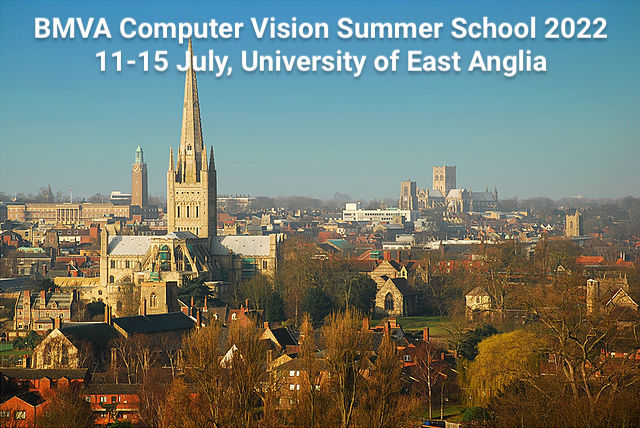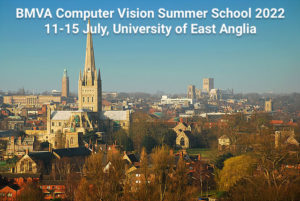post by Muhammad Suhaib Shahid (2020 cohort)
Over the summer of 2022, I attended the annual British Machine Vision Association summer school at The University of East Anglia. The weeklong summer school provided an opportunity for computer vision researchers, in both academia and industry, to explore a wide range of computer vision topics through intensive lectures and labs. From the 11th to the 15th of July, I had the chance to learn from expert instructors, participate in hands-on activities, and connect with other professionals and students in my field. In this reflection, I will share my key takeaways and insights from the summer school, as well as any challenges or setbacks I faced and how I overcame them. I will also discuss the impact of summer school on my personal and professional development.
Over the course of the week, I had the opportunity to learn from expert researchers from some of the most active research groups in the field of computer vision both in the UK and abroad. Throughout the series of lectures, they provided comprehensive overviews of the fundamental concepts and techniques of image processing and analysis, as well as lectures on unsupervised learning, image segmentation and deep learning for Computer Vision. Though most computer vision researchers are very much adept in these areas, re-covering these subjects proved key for a complete understanding of the advanced topics that we encountered later in the program.
Over the five-day period, there were 16 lectures and one lab with each session being run by an expert lecturer or instructor in that specific field. Most relevant to my research were two afternoon sessions held on days two and three. The first headed by Oscar A. Mendez on “Deep Learning for Computer Vision” and the second by Chris Willcocks on “The concepts and characteristics of different deep generative modelling approaches”. The two sessions addressed the use of Computer Vision in medical image processing and synthesis, a topic key to my research. Deep learning, which is a type of machine learning that uses neural networks to learn from large amounts of data, was a reoccurring theme throughout the week. Many researchers, myself included, encounter issues surrounding finding large enough data sets, a problem prevalent, especially when working with medical imaging. I found these topics to be particularly interesting, as they are at the forefront of computer vision research and have many practical applications in a variety of fields.
In addition to the lectures and discussions, we also had the opportunity to participate in a few hands-on activities that allowed us to apply what we were learning in a practical setting. The afternoon session of the first day took place in a computer lab. Working on individual tasks, through helping each other along when needed, we implemented various PyTorch functionalities from scratch. It was fascinating to see how the tools and packages used in our everyday work as researchers are implemented, something that often crosses my mind now months later whilst undertaking various programming endeavours. I appreciated the opportunity to work with my team and receive both instruction and feedback from the instructors.
One of the most memorable experiences I had during the summer school was the opportunity to connect with other professionals and students interested in computer vision. The program brought together a diverse group of individuals from a variety of backgrounds, disciplines, and even countries. It was inspiring to see the different perspectives and approaches that people brought to the table. We had several networking events and social activities that provided us with the opportunity to get to know each other and learn about each other’s interests and goals. I made some lasting connections that I believe will be beneficial in my future academic and professional endeavours.
Overall, the summer school has had a significant impact on my personal and professional development. In addition to learning about the technical aspects of computer vision, I also gained valuable skills in networking, problem-solving, and communication. I feel more confident in my ability to design and implement computer vision systems, and I am excited to explore the many applications of this technology in the future. However, the summer school was not without its challenges and setbacks. One of the biggest challenges I faced was keeping up with the fast-paced nature of the program. There was a lot of information to absorb in a short period of time, and I found myself struggling to keep up at times. However, I was able to overcome this challenge by staying organized, asking for help when I needed it, and making the most of the resources available to me.
I do have a few suggestions for improving the summer school experience for future participants: it would be helpful to have more time for networking and connecting with professionals in the field. While I enjoyed the opportunity to meet and collaborate with other students, I also think it would be valuable to have more structured opportunities to engage with industry professionals and learn about career paths in computer vision. There was only a lecture that briefly touched on how to find the best post-research opportunities. Additionally, the time allocated to lab work was not sufficient. There was only one session, and no opportunity to implement our knowledge in any real-life scenarios; I would suggest that future events take advantage of the wide knowledge base available and allow students to work in groups, fostering greater opportunities to apply their domain-specific knowledge.
In conclusion, the summer school on computer vision was a valuable and enriching experience that has had a lasting impact on my personal and professional development. I am grateful for the opportunity to have learned from expert instructors and to have connected with other like-minded individuals. I highly recommend this summer school to anyone interested in exploring the exciting field of computer vision!


